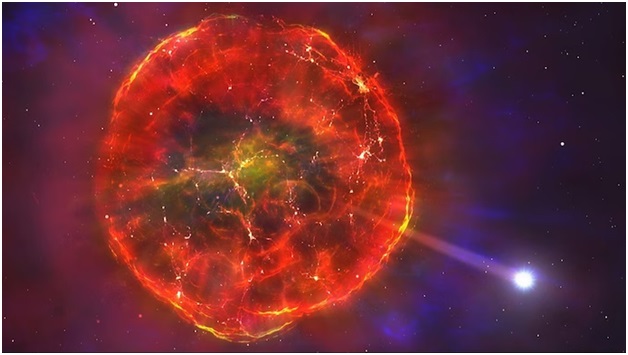New Artificial Intelligence System BTSbot Discovers Supernova (India Today)

- 17 Oct 2023
Why in the News?
An international team led by Northwestern University has successfully created an artificial intelligence (AI) tool Bright Transient Survey Bot (BTSbot) that can detect, identify, and classify supernovae.
What is the Bright Transient Survey Bot (BTSbot)?
- The Bright Transient Survey Bot operates as a machine-learning algorithm, undergoing training with a vast dataset comprising over 1.4 million images from nearly 16,000 sources.
- Utilizing data from the Zwicky Transient Facility (ZTF), it successfully identified the recently discovered supernova named SN2023tyk.
- Functionality: The algorithm seamlessly automates the process of seeking potential supernovae across the night sky.
- In the case of SN2023tyk, it autonomously requested the supernova's spectrum from the Palomar Observatory.
- Subsequently, the Spectral Energy Distribution Machine (SEDM), another robotic telescope, performed comprehensive observations to obtain the source's spectrum.
- Advantages: This innovative system not only streamlines the entire workflow of searching, detecting, confirming, classifying, and announcing new supernovae but also eradicates human error, significantly enhancing the speed of the process.
- The Bright Transient Survey Bot showcases the potential of automated technology in advancing astronomical discoveries.
What is artificial intelligence?
- Artificial Intelligence (AI) refers to the interdisciplinary field of computer science dedicated to developing algorithms and computational models that emulate human cognitive processes.
- Rooted in machine learning and advanced data analytics, AI aims to create systems capable of reasoning, problem-solving, and decision-making.
- AI involves the study and design of intelligent agents, encompassing areas like natural language processing, computer vision, and expert systems.
- It seeks to enhance machines' ability to learn from experience, adapt to new information, and perform tasks that traditionally necessitate human intelligence, fostering innovation across diverse domains, including healthcare, finance, and robotics.
